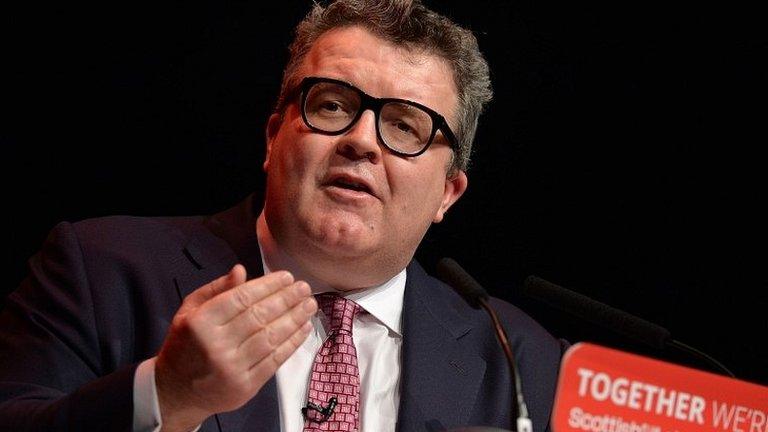Labour: Momentum, Unite and a 'plan' to take over the party
- Published
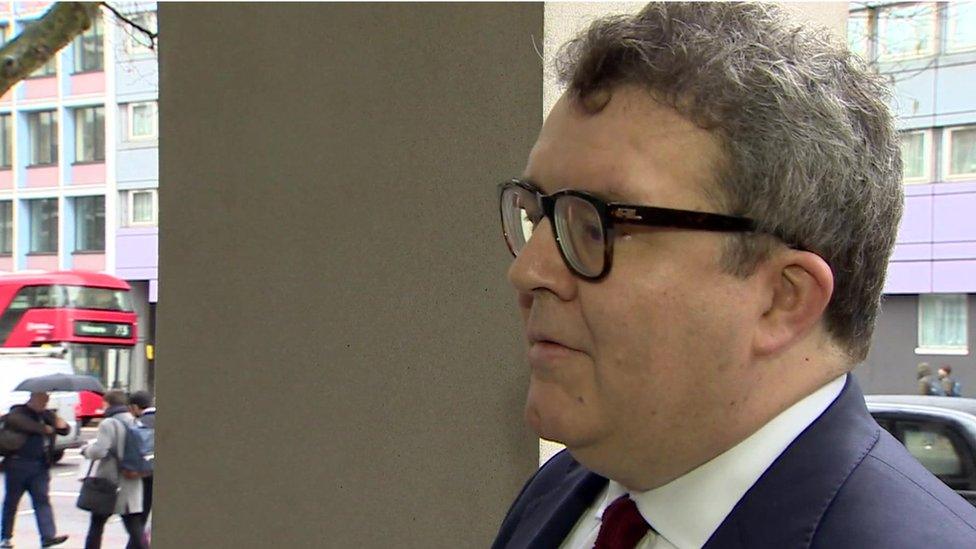
Labour's deputy leader Tom Watson says it is his duty to "call out" threats to Labour's future
"If this secret left-wing plan to take over the Labour Party comes to pass, our electoral existence is in peril."
Tom Watson did not mince his words when he spoke to me on Monday morning.
But was he really more concerned about the future of his party - or the future of his union, the now-inappropriately named Unite? Both are, in fact, currently inextricably linked.
Mr Watson had been personally close to the union's general secretary Len McCluskey - they are former flatmates.
But relations deteriorated when Labour's deputy leader failed to convince Mr McCluskey to persuade Jeremy Corbyn to agree a date when he would stand down as party leader last summer, after eight out of 10 of his MPs declared no confidence in him.
So there is now political and personal animosity.
Mr McCluskey is up for re-election at the end of next month and those close to Mr Watson see an opportunity to weaken both him and the current party leader.
Mr McCluskey's main opponent is the West Midlands organiser Gerard Coyne, who is politically to his right.
Mr Watson is backing the challenger in part because Unite, under its current leadership, has generously funded Mr Corbyn's two leadership campaigns - and a change at the top might put a block on cheques to any aspiring left-wing replacement.
Proxy battle
Mr Coyne's initial pitch was that the union was too focused on Westminster politics under Mr McCluskey and not enough on members' interests.
But some of Mr Corbyn's critics at Westminster argued that the Coyne campaign had had too subtle a message to gain prominent media coverage - and the contest should be recast as a proxy battle for Labour's future.
So this weekend Mr Watson was gifted strong ammunition to launch a campaign of "shock and awe" to get party and union members to sit up and take notice.
Jon Lansman set up Momentum to maintain the spirit of the first Corbyn leadership campaign, harnessing the energies of those who came into Labour to change both the party and the country.
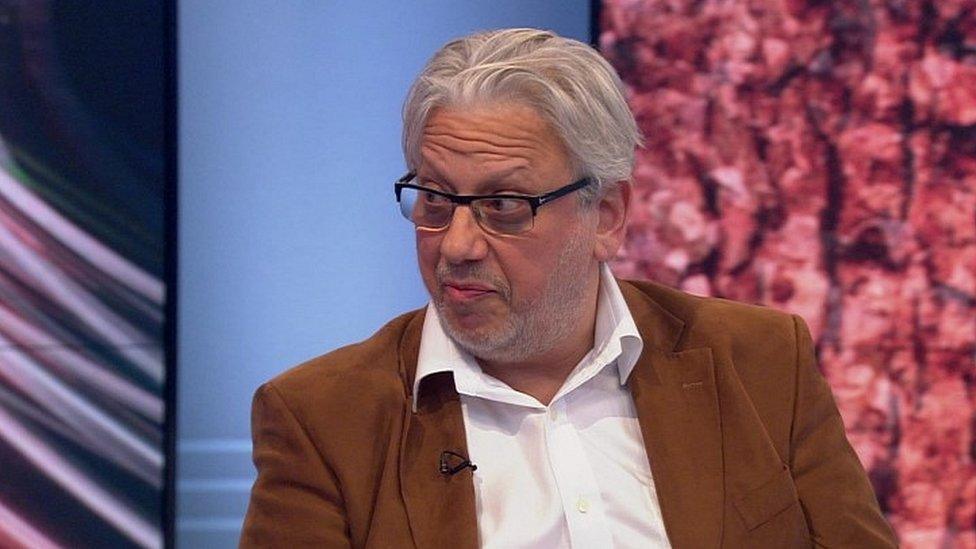
Jon Lansman wants Momentum to be a force for lasting change within Labour
But the recording of his remarks to a local group in Richmond, obtained by the Observer, suggested that he was rather more interested in changing Labour than changing the government - he talked of how an early election would "disrupt our plans" but "what we need to do next is a number of things to change the nature of the Labour Party".
Even better for Mr Watson was the suggestion that the link forged between the current Unite general secretary and Momentum was going to become stronger and tighter.
Mr Lansman opined that "assuming Len McCluskey wins the general secretaryship...Unite will affiliate to Momentum and will fully participate in Momentum".
Mr Watson has suggested that Mr McCluskey would rather fund a left-wing faction inside Labour than the party itself. He believes this revelation might encourage more moderate members of Unite to turn out and vote to change their general secretary.
The acting Unite leader Gail Cartmail told me that there were no plans to affiliate to Momentum and Mr Watson had not checked his story before going public.
A hard-left plot?
But with or without union funding, just what is the "hard-left plot" that Mr Watson believes will destroy Labour?
First, Momentum wants to see Labour's leadership rules changed.
Currently a candidate for the leadership requires the support of 15% of MPs and MEPs before the wider, left-wing membership gets a chance to vote for them. Mr Corbyn only succeeded in getting on to the ballot in 2015 because some of those to his right 'lent' support to broaden the debate.
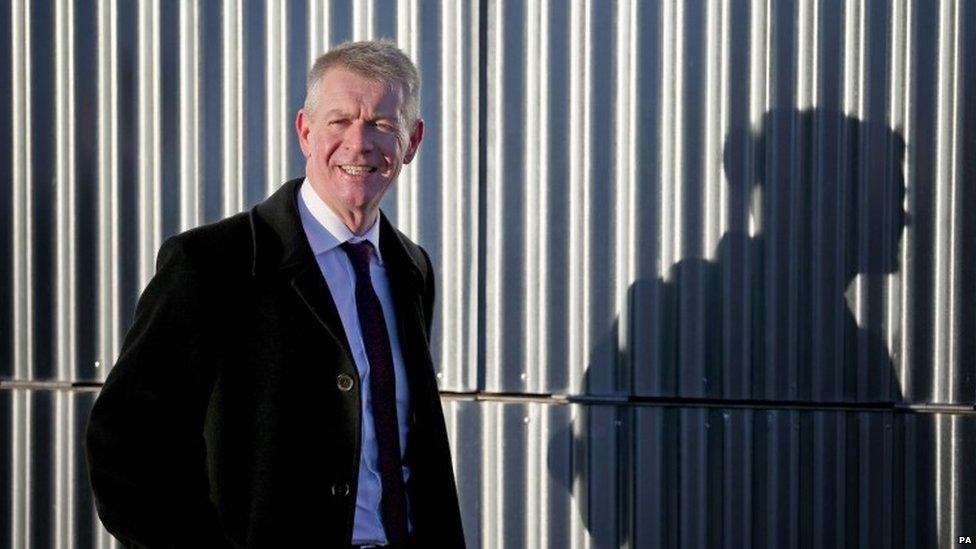
Gerard Coyne is trailing Len McCluskey in terms of branch support in Unite's leadership contest
Those MPs who regarded their actions subsequently as a huge mistake will not make the same one twice. Mr Lansman is heard emphasising how "crucial" it is that the 15% threshold is reduced should Mr Corbyn stand down.
At this September's Labour conference, it is almost certain delegates will be given the option to reduce that threshold from 15% to only 5% - a much smaller hurdle for a left-wing candidate to overcome.
Mr Lansman is recorded saying "we really need to win that vote" and "we have to work to get delegates to that conference".
But internal groups such as Labour First and Progress - put simply, Brownites and Blairites and those who were once called "modernisers" - are working together in many local constituencies to select delegates sympathetic to them.
Like Mr Watson, their view is that if Mr Corbyn was simply replaced by someone with similar politics, Labour would have missed an opportunity to appeal to a wider electorate who believe the party is now too left wing.
The only way to stop the changes is to get more anti-Corbyn delegates to Labour's conference this autumn than those who support the leadership.
So Mr Watson's apocalyptic warnings are, in part, aimed to sound a klaxon that the longer-standing but demoralised moderate party members will hear.
Conference showdown?
Equally, perhaps the reason that Mr Lansman was so honest about Momentum's intentions was to encourage left-wing, newer Labour members who would prefer to be on demonstrations to attend the rather tedious party meetings that nominate conference delegates.
Secondly, Mr Watson believes that Momentum will seek to depose MPs and councillors who it regards as hostile or right wing or both.
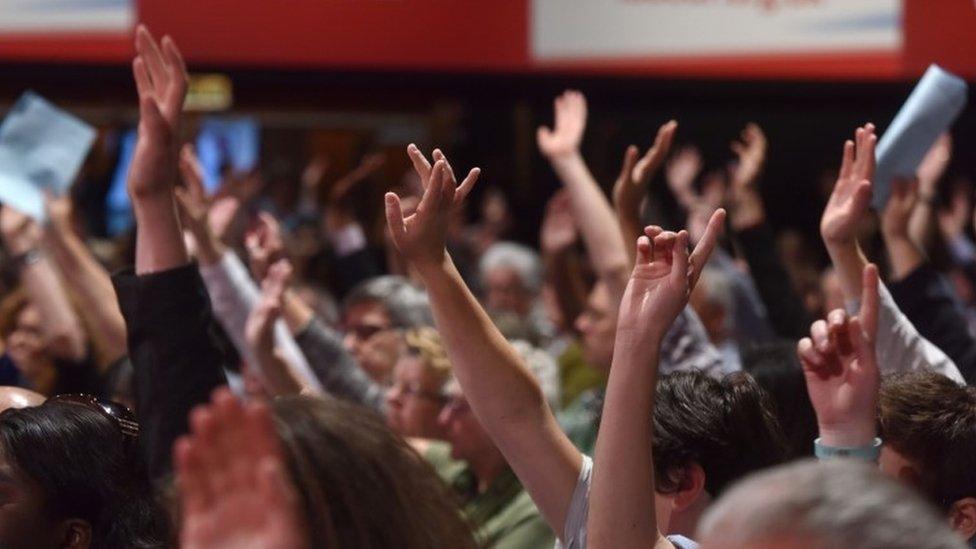
Is Labour heading for a showdown at its autumn conference in Brighton?
Momentum says that it is entitled to put forward its views and it is up to local members to decide who they would like to represent them. And far from hatching "secret" plans, Mr Lansman made his remarks at a meeting that was open to the wider public.
It is perfectly possible, of course, that Mr McCluskey wins the union leadership contest and Momentum members fail to get the leadership changes it wants.
So the armed impasse between Corbyn supporters and opponents could continue, very possibly, to the party's electoral detriment.
Already sources close to the leadership are warning that Mr Watson's intervention means "we are really worried about our local election prospects" in the spring because he has highlighted divisions.
"They were going to be tough enough to begin with but this stuff from Watson put the elections in real jeopardy," they say.
So if there are poor results, the anti-Corbyn camp would use this as further evidence of the leadership's failures. But leadership supporters are getting their retaliation in first by trying to shift the blame to the deputy leader's door.
At the end of a shadow cabinet "away day" on Monday afternoon, Messrs Corbyn and Watson issued a statement saying they had had "robust and constructive" discussions.
But there may have been more of the former - and a bit less of the latter.
- Published20 March 2017
